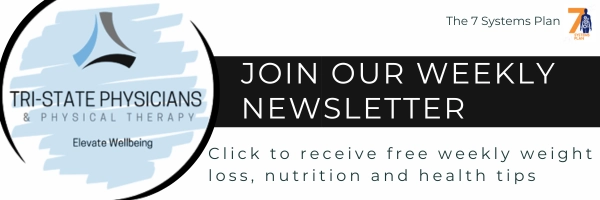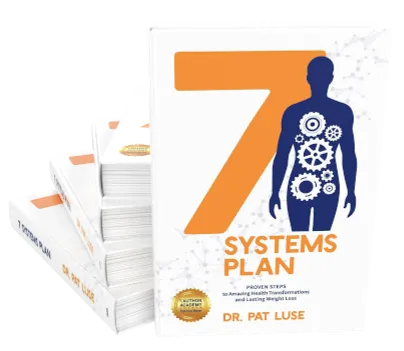Protein: For Weight Loss in South Sioux City NE
We all know protein is essential. But the amount and type consumed can make all the difference. It can be a powerful weight loss tool.
Protein, a vital nutrient, is the building block for nearly all tissues in the body, from bones and muscles to blood and organs. Unlike fats and carbohydrates, we don’t store protein, making regular consumption essential. It provides energy, supports the immune system, and helps us feel full.
Protein plays a crucial role in brain health, producing neurotransmitters that regulate mood and emotions. Additionally, protein aids in delivering nutrients to brain cells, ensuring clarity of thought, optimal memory retention, and sufficient mental energy for tasks.
High protein diets in South Sioux City NE can also be effective for weight loss (maybe even more than calorie restriction)!
Protein for Weight Loss
Many people feel drawn to dietary changes as a means of losing weight. In my experience working with thousands of patients, I’ve discovered many beneficial things you can do. Getting in the correct amount and type of protein each day can be a very effective tool.
A recent study found that eating the correct amount of protein (30% of calories) was more effective for weight loss than calorie restriction and intermittent fasting. Why not use all three for maximum weight loss, as we teach in the 7 Systems Plan course?

Participants in this study were all encouraged to exercise the same amount to eliminate this as a factor in weight loss. It’s worth noting that after 60 days, weight loss, body fat, BMI, and waist circumference were significantly lower in the 30% protein group.
Fasting blood glucose, HbA1c, triglycerides, total cholesterol, and LDL improved significantly, and HDL increased. Protein is a powerful tool for metabolic health and lean muscle mass, and I’ve noticed many positive impacts by staying on top of my protein intake.
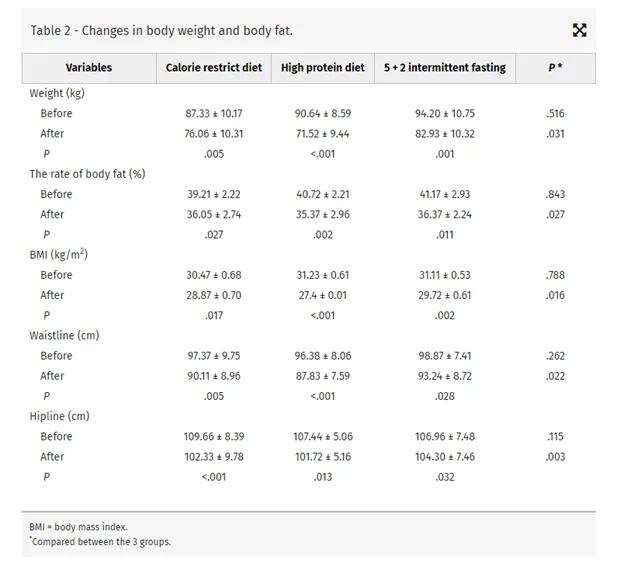
The Protein Powder Drinks

Nutrition advocates promote protein powders for their ability to enhance muscle growth, boost metabolism, aid in weight loss, optimize physical performance, increase energy levels, and combat aging. The problem is adding them to a diet already too high in protein can have serious health consequences. To keep a balance, use only quality protein shakes, but at the same time, decrease your meat intake.
In 2018, the Clean Label Project conducted a study on 134 popular protein powders and found detectable levels of heavy metals in the majority, including plant-based and organic options. Additionally, 55% of the tested powders were positive for BPA (plastic). Furthermore, many protein supplements contain added sweeteners, flavorings, fillers, preservatives, and gums.
NutriDyn uses only the purest ingredients in their products. Their functional food shakes contain brown rice or pea protein and are far more than just a protein powder. They are medically formulated to help optimize the function of each System in your body. Dynamic Daily Meal helps build muscle and lose fat.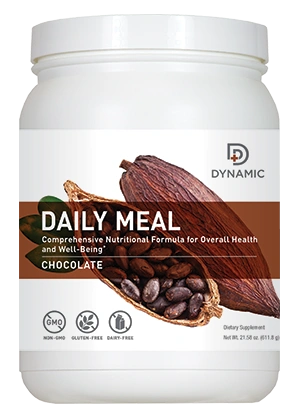
It is vital to understand the recommended protein intake, only use quality protein powder, and avoid excessive protein consumption to safeguard overall health and well-being.
The Dangers of Excessive Protein Consumption in South Sioux City NE
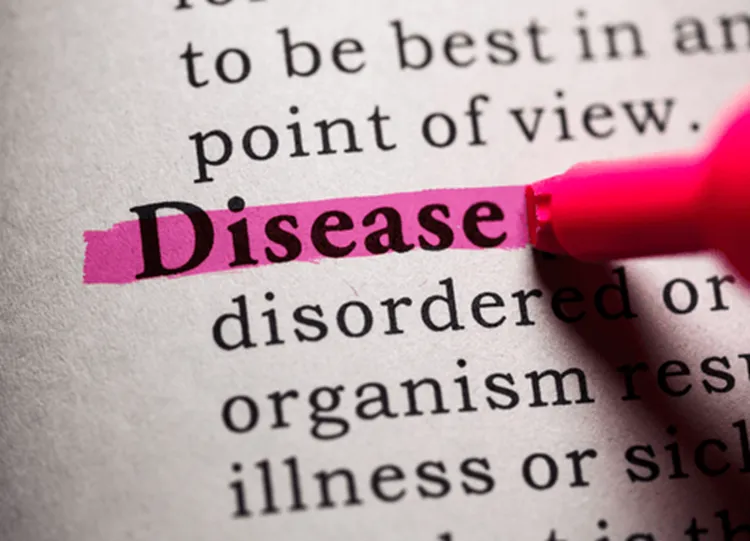
A doctor with a vast online audience recommends 120-190 grams of protein daily. That can cause some significant health problems. While protein is crucial for optimal bodily function, consuming excessive amounts can have severe consequences:
1. Weight Gain: Overconsumption of protein can lead to weight gain, as excess protein is often stored as fat, especially when combined with a high-calorie diet.
2. Kidney Disease: High protein intake and inadequate fluid intake increase the risk of kidney stones. Prolonged high protein consumption, particularly from animal sources, can also damage the kidneys and lead to proteinuria.
3. Osteoporosis: Diets high in protein and low in alkali-rich foods create an acidic environment in the body, causing calcium loss from bones. This deficit increases the risk of osteoporosis and fractures.
4. Cancer: Several studies have linked a high animal protein diet to increased risks of breast, bowel, and prostate cancers, particularly with red and processed meats.
5. All-cause Mortality: Consuming excessive amounts of protein, particularly from animal sources, can increase mortality.
The Detrimental Effects of Too Much Animal Protein
Animal-based foods may be popular protein sources, but scientific research unequivocally demonstrates their negative impact of overconsumption on health.
1. Increased Risk of Chronic Diseases and Premature Death
A monumental study published in the British Medical Journal in May 2017, involving over half a million participants, revealed a disturbing association between excess red meat consumption and higher mortality rates from cancer, heart disease, high blood pressure, stroke, respiratory disease, infection, kidney disease, chronic liver disease, and diabetes.
2. Heightened Risk of Diabetes
Diets rich in animal protein correlate with an elevated risk of diabetes. Red meat, being a primary source of animal protein, increases the likelihood of type 2 diabetes due to the effects of heme iron, nitrites, and advanced glycation end products.
Conversely, a 2009 study found that individuals adhering to a plant-based diet tend to exhibit lower blood sugar levels, improved insulin sensitivity, and a staggering up to 78% reduced risk of developing type 2 diabetes.
3. Elevated Risk of Cardiovascular Disease (CVD)
Meat consumption contributes to Advanced Glycation End Products (AGEs), harmful compounds formed when sugars combine with amino acids in proteins. AGEs damage blood vessels and promote atherosclerosis. Furthermore, AGEs are linked to kidney disease, insulin resistance, diabetes types 1 and 2, inflammation, and heightened oxidative stress, negatively impacting cellular functions like lipid synthesis, mitochondrial metabolism, and cell signaling.
Excess animal protein also fosters the growth of unfavorable bacteria that produce trimethylamine-N-oxide (TMAO), a compound implicated in the blockage of heart and brain blood vessels. A study tracking 81,337 participants over 6-12 years discovered a direct correlation between meat protein consumption and an increased risk of cardiovascular mortality. Conversely, higher protein intake from nuts and seeds corresponded to a 40% lower cardiovascular risk.
4. Increased Risk of Cancer
Excessive animal protein intake triggers the production of insulin-like growth factor 1 (IGF-1), which, while beneficial during growth and development, promotes aging and is associated with an elevated risk of several cancers. Chicken meat contains significant amounts of heterocyclic amines (cancer-causing chemicals). A study examining meat intake and prostate cancer progression found that men with high prognostic risk and a high poultry intake experienced a four-fold increased risk of recurrence or progression.
5. Induction of Inflammation
Heme iron, abundant in meat, induces a pro-inflammatory environment by generating reactive oxygen species, oxidizing lipids and proteins, and causing DNA damage. Animal protein also contains pro-inflammatory compounds like arachidonic acid, saturated fat, and carnitine.
Plant Protein Sources: The Ultimate Winner
If you are following the 7 Systems Plan, you know we recommend using less animal protein and more plant protein. The merits of plant protein outshine those of animal protein in every aspect, but consuming some animal protein is not a problem. Complemented by health-enhancing fiber, phytochemicals, vitamins, and minerals, plant protein represents the optimal “protein package.” It provides all essential amino acids while reducing disease risks and extending lifespan.
A comprehensive study by researchers at the U.S. National Institutes of Health’s National Cancer Institute examined data from over 400,000 individuals aged 50 to 71 over 16 years. Results indicated that individuals consuming above-average amounts of plant-based protein exhibited a 5% lower mortality rate. Furthermore, higher plant protein intake corresponded to increased longevity. Surprisingly, substituting just 3% of animal-based protein with plant-based alternatives resulted in a 10% reduction in mortality risk.
Another review of 32 studies demonstrated that consuming plant protein was associated with a reduced risk of cardiovascular-related deaths, such as heart attacks and strokes. Furthermore, research has uncovered the preventive potential of a daily plant-based diet against various cancers. Such a diet alters the process of carcinogenesis, influences the immune system and growth factors like insulin, combats free radicals and oxidative stress, and even affects genes signaling cancer cell death.
The evidence strongly favors plant protein as the superior choice over animal protein. By embracing more plant-based protein sources, individuals can enjoy many health benefits while reducing the risks of chronic diseases, cancer, cardiovascular ailments, and inflammation. Plant protein is key to nourishing the body, supporting longevity, and unlocking optimal well-being.
Cracking the Code: Calculating Your Protein Needs
The recommended daily protein intake in the United States is 0.36 grams per pound of body weight (approximately 0.8 grams per kilogram). For example, a person weighing 130 pounds (60 kg) should aim for around 48 grams of protein daily.
However, individual protein needs vary based on age, activity level, and pregnancy or lactation. Generally, adults should target a daily protein intake ranging from 45 to 80 grams. Surprisingly, many adults in developed countries consume 150 to 200 grams of protein daily, well beyond the recommended amount.
You can use this straightforward formula to determine your daily protein target:
1. Discover your “P” value:
- For kids aged 4 to 13: 0.43
- For adolescents aged 14 to 18: 0.39
- For adults aged 19 to 64 (moderately active): 0.36
- For seniors aged 65+ and special needs (e.g., pregnant women): 0.44 to 0.522
2. Multiply your lean body weight (in pounds) by your “P” value. If you carry significant excess weight, you may adjust the formula to align with your desired healthy body weight.
Great Plant-Based Protein Sources
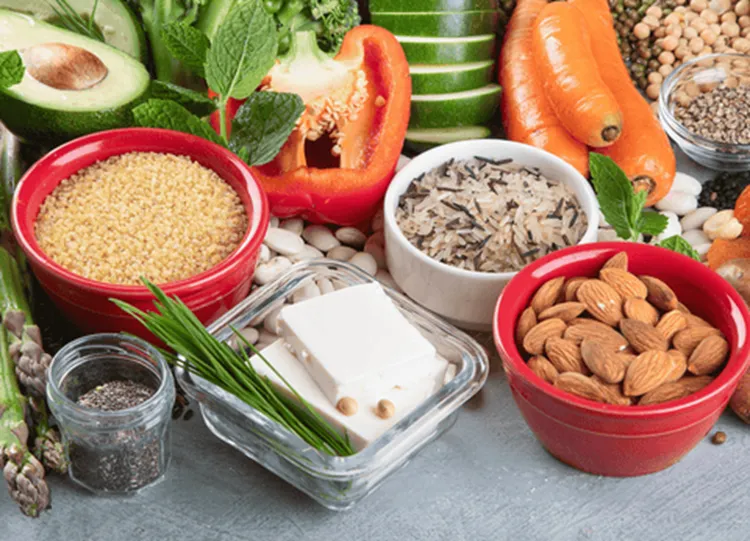
Embrace the mosaic of plant-based protein options, enriching your diet with diverse amino acid profiles and essential vitamins and minerals. Variety is the spice of life!
Discover the protein content (grams per serving) of these healthful allies:
Nuts and Seeds (1 ounce/30 grams)
- Walnuts: 4.5 grams
- Almonds: 6 grams
- Cashews: 4.5 grams
- Chia seeds: 6 grams
- Flaxseed: 6 grams
- Hemp seeds: 9.5 grams
- Sunflower seeds: 5.5 grams
- Pumpkin seeds: 8.5 grams
Legumes (½ cup/80 grams)
- Black beans: 8 grams
- Pinto beans: 7 grams
- Chickpeas: 7.5 grams
- Kidney beans: 8 grams
- Lentils: 8 grams
- Peas: 8 grams
Soy Foods (3 ounces/100 grams)
- Tofu: 4 grams
- Tempeh: 13 grams
- Edamame: 17 grams
Grains (½ cup cooked/100 grams)
- Quinoa: 4.5 grams
- Brown rice: 3.5 grams
- Amaranth: 4.7 grams
- Millet: 3.5 grams
- Oats: 3 grams
- Spelt: 6 grams
Best Meat Protein Sources (one ounce)
- Fish (see the list in the 7 Systems Plan book for the highest in omega-3 and lowest in mercury fish): 7 grams
- Grass-fed beef: 7 grams
- Chicken (free range only): 7 grams
Video of the Week
Recipe of the Week:
From Teresa’s 7 Systems Kitchen
Falafel

- 1 can Thrive Market Eden Organic Garbanzo Beans (chickpeas)
- ½ cup fresh parsley
- 1/2 small onion
- 2 teaspoons Thrive Market organic Emperor’s Kitchen chopped garlic
- 2 teaspoons organic ground coriander
- 1/4 teaspoon organic Thrive Market chilli powder
- 1 Tablespoon gluten free flour
- Himalayan Pink Salt
- Pepper
- Extra-virgin olive oil
Instructions
- Drain ALL the liquid from chickpeas, let them sit to make sure they are dry.
- In a food processor, process the parsley and onion. Add chickpeas and give it couple of pulses until it forms into coarse mixture.
- Transfer to a bowl and add spices, flour, salt and pepper. Mix thoroughly using a spoon.
- Meanwhile heat a couple tablespoons of oil in a cast iron or stainless steel skillet. Form golf ball size balls and lightly press them to form patties. On a medium-high heat, fry the falafels until they are browned and have a crisp crust.
- Serve hot with cool Tzatziki and Tahini.
Tzatziki
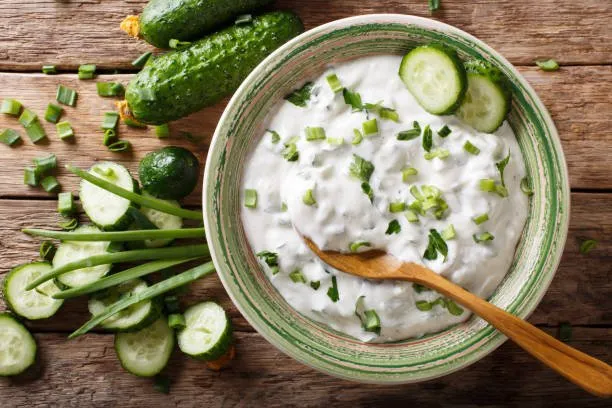
- 1 cup grated cumcumber
- ¾ cup plain Greek yogurt
- 1 Tablespoon extra-virgin olive oil
- 1 teaspoon dried dill
- 1 teaspoon dried mint
- 1 Tablespoon lemon juice
- 1 teaspoon Thrive Market organic Emperor’s Kitchen chopped garlic
- ¼ teaspoon Himalayan Pink Salt
Instructions
Lightly squeeze the grated cucumber in your hands over the sink to remove extra moisture. Place in bowl. Add remaining ingredients and stir. Let mixture sit for 5 minutes.
It can be stored in the refrigerator for about 3 days.
Sign up below to get our weekly newsletter
sent directly to your email inbox!
OFFICE HOURS
Monday
8:00am - 6:00pm
Tuesday
8:00am - 6:00pm
Wednesday
8:00am - 6:00pm
Thursday
8:00am - 6:00pm
Friday
8:00am - 6:00pm
Saturday
8:00am - 10:45am
Sunday
Closed
Tri-State Physicians &
Physical Therapy Clinic
3900 Dakota Avenue #6
South Sioux City, NE 68776


